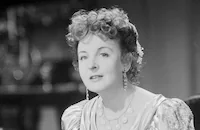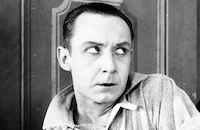Exit Smiling

Brief Synopsis
Cast & Crew
Sam Taylor
Beatrice Lillie
Jack Pickford
Doris Lloyd
De Witt Jennings
Harry Myers
Film Details
Technical Specs

Synopsis
Jimmy Marsh, a bank teller, is in love with Phyllis, daughter of the bank president. Jesse Watson, vice president and cashier, who also seeks the hand of Phyllis, considers investing in a roadhouse owned by bootlegger Tod Powell. Seeing Jimmy intoxicated there, Watson gets Powell to forge Jimmy's name to a gambling note and later has him discharged. Jimmy falls in with a repertory company and, thanks to Violet--the utility woman and wardrobe mistress--is hired as a stagehand; then, coached by Violet, he becomes the understudy for the villain. When the show plays in his hometown, Violet dons male attire and plays the villain herself. Violet learns that Powell has threatened Watson with exposure; and through her scheming, Jimmy is cleared of the charge and is reunited with Phyllis.

Director

Sam Taylor
Cast

Beatrice Lillie
Jack Pickford

Doris Lloyd

De Witt Jennings

Harry Myers
Tenen Holtz
Louise Lorraine

Franklin Pangborn
D'arcy Corrigan
William Gillespie
Carl Richards
Crew

Film Details
Technical Specs

Articles
Exit Smiling
Pickford's own personal legacy was far more sordid. The younger brother of pioneering actress Mary Pickford, Jack went on to become known in Hollywood for his drinking, drug use and womanizing and for spending his share of the Pickford family fortune recklessly and contracting syphilis which he eventually passed on to his first wife Olive Thomas.
Exit Smiling featured some enjoyable performances, including Franklin Pangborn's flamboyant turn as the company's leading man -- the kind of mincing, queeny part he played time and again in the movies.
Despite such enjoyable performances and Lillie's own talents, Exit Smiling was a box office failure that reduced Lillie to secondary roles for the rest of her screen career.
Dubbed "the funniest woman in the world," Lillie made her solo debut on the British stage in 1914 and became a hit with British fans thereafter. When she moved to Broadway, Noel Coward and Cole Porter wrote shows and songs for her. She even excelled in radio though she never made as much of a name for herself in film. The eccentric actress also became a favorite performer for World War II soldiers. Her final stage role was in 1964 as Madame Arcati in "High Spirits" during which Lillie began to experience symptoms of Alzheimer's disease.
Lillie was realistic in her assessment of the film. "The job I was doing in Exit Smiling didn't strike me as anything to set the world on fire. Most of the time, I couldn't make out what the movie was all about. Neither could anyone else.Ó
MGM wanted to put a three year option on Lillie's services but the actress was worried that that might hamper her theater work. Lillie didn't find her stay in Hollywood a total loss. According to her biographer Bruce Laffey, Lillie claimed to have had affairs with both John Gilbert and Rudolph Valentino.
Following Exit Smiling Lillie signed with producer Charles Dillingham for her first musical comedy on Broadway, Oh, Please!, a slight bedroom farce panned by critics who nevertheless praised Lillie's comic abilities.
For Lillie the transition from theater to film was quite difficult.
"I was used to working for months to perfect a gesture or a piece of business," she said in her autobiography Every Other Inch a Lady.
"Here, we were due to finish in five weeks, and it was hard to believe that these disconnected scenes could possibly be patched together to make a movie with any kind of plot.Ó
"For the longest time, I refused to see Exit Smiling. It's an awful feeling to sit watching yourself, knowing there's nothing you can do about it."
According to Laffey in The Funniest Woman in the World, "Bea did not enjoy performing for a camera. She missed the audience reaction she was used to and had no way of knowing if what she was doing was funny. The technicians were too busy with their own work to pay attention to what was happening in front of the camera."
"I thought it was mostly a piece of cheese" was Lillie's own assessment of Exit Smiling.
In an odd little scandal that came up after production wrapped, Lillie was at home with friends reading the newspaper when she stumbled upon a news story in which the wife of Exit Smiling's scenario writer Tim Whelan was suing Lillie, claiming "alienation of affection." The wife wanted $20,000 according to Lillie (The Funniest Woman in the World claimed it was $100,000) of which Lillie saltily replied "It struck me that, had it been true, she'd set a bargain price on his feelings."
The wife ended up canceling the action and the claim faded into obscurity.
Director: Sam Taylor
Screenplay: Marc Connelly, Joseph Farnham, Sam Taylor, Tim Whelan
Cinematography: Andre Barlatier
Film Editing: Daniel J. Gray
Art Direction: Cedric Gibbons, Fredric Hope
Music: Linda Martinez (new score)
Cast: Beatrice Lille (Violet), Jack Pickford (Jimmy Marsh), Doris Lloyd (Olga), DeWitt Jennings (Orlando Wainwright), D'Arcy Corrigan (Macomber), Franklin Pangborn (Cecil Lovelace).
BW-77m.
by Felicia Feaster

Exit Smiling
Quotes
Trivia
Miscellaneous Notes
Released in United States 1926
Released in United States March 1975
Released in United States 1926
Released in United States March 1975 (Shown at FILMEX: Los Angeles International Film Exposition (The Ides of March) March 13-26, 1975.)













